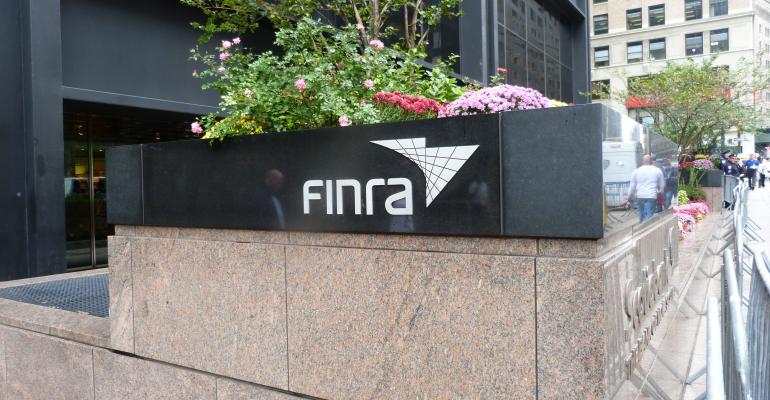A Georgia Superior Court overturned an arbitration award previously decided in favor of Wells Fargo, arguing that counsel for Wells Fargo “manipulated the FINRA arbitrator selection process” and violated FINRA’s code for arbitration proceedings. In response, one investor advocacy group called for Securities and Exchange Commission and congressional inquiries into FINRA’s arbitration process.
Fulton County Superior Court Judge Belinda Edwards penned the decision vacating the award levied against petitioners Brian Leggett and Bryson Holdings for more than $80,000, saying they were denied the right to a computer-generated neutral list of arbitrators and that Wells Fargo counsel was able to have particular arbitrators removed as options for selection.
“Permitting one lawyer to secretly red line the neutral list makes the list anything but neutral, and calls into question the entire fairness of the forum,” the decision read.
According to Edwards’ decision, in 2015 and 2016, Leggett and Holdings lost more than $1.1 million in a merger arbitrage investment strategy recommended by their Wells Fargo broker, who, the court said, allowed their account to be overconcentrated in certain stocks and industries.
They initiated arbitration proceedings against Wells Fargo, and FINRA supplied both parties with a number of potential arbitrators from its “Neutral List Selection System,” which was created in 1998 and designed to generate a random list of potential arbitrators for cases.
In July 2017, prior to the start of the proceedings, Wells Fargo’s counsel submitted a letter to FINRA asking that Fred Pinckney, one of the potential arbitrators, be removed from the list, arguing he “harbored personal bias” against Wells lead counsel Terry Weiss. Leggett argued the broker/dealer hadn’t offered any evidence to support the claim.
In fact, Weiss and Wells Fargo insisted to FINRA that three arbitrators be removed from the neutral list even before the selection process, without notifying Leggett, according to the judge’s decision. The only reason the court knew about the secret agreement was because FINRA accidentally included one of those arbitrators on the neutral list, according to Edwards.
Leggett criticized the purported “unwritten agreement” between FINRA and Weiss about the three arbitrators (called the Postell arbitrators in the decision) being removed from contention, with Leggett’s attorney calling it “extremely troubling” in a letter to FINRA and arguing that any tacit agreements removing arbitrators from being considered in such a fashion would call FINRA’s entire arbitration process into question.
“Mr. Weiss’ statement raises several questions that must be answered,” the letter from Leggett’s attorney to FINRA read. “Were the other Postell arbitrators stricken from the list provided to me in this case? Does Mr. Weiss have secret agreements with FINRA concerning other arbitrators from other cases?”
Despite the purported revelations about an agreement between FINRA and Wells Fargo’s counsel, the FINRA director of dispute resolution struck Pinckney from contention. Wells Fargo was also successful in removing another arbitrator from being a potential choice on the basis that other attorneys in his firm represented plaintiffs in a suit against Wells Fargo.
In response to Edwards’ decision, a FINRA spokesperson said the agency reviewed all cases concerning Weiss as counsel, and that none of the three arbitrators in question had been excluded from ranking lists before it was sent to Wells Fargo and Leggett, and cited the fact that Pinckney was included on the list as evidence.
“There has never been any agreement between FINRA Dispute Resolution Services and attorney Terry Weiss regarding appointment of arbitrators. Any assertions to that effect are false,” the FINRA spokesperson said. “As the neutral administrator, we continually strive to make the FINRA forum the fairest, most efficient program available and stand behind the integrity of our neutral list selection process.”
A Wells Fargo spokesperson "adamantly" denied all of the allegations included in the decision and said the company intended to appeal.
"FINRA has well-established rules for admitting arbitrators to its roster and the process is fair to all parties," they said. "Wells Fargo Advisors followed this process, and both parties had the opportunity to make arguments regarding each of these issues to the arbitrators and to FINRA."
In response to the ruling, Public Investors Advocate Bar Association (PIABA) President Michael Edmiston called for an investigation by the SEC and potential congressional hearings, also citing the recent Government Accountability Office (GAO) report questioning the stringency of the SEC’s oversight over FINRA.
“Investors must have the assurance that the industry-sponsored FINRA arbitration forum is not tipping the scales against investors by excluding arbitrators who have issued pro-claimant awards in prior cases,” Edmiston said.
PIABA has been a frequent and vociferous critic of FINRA’s arbitration process, arguing that the number of unpaid arbitration awards increased year over year between 2019 and 2020, asserting that 24% of money awarded that year went unpaid. The advocacy group also called FINRA arbitrators to task for granting expungement requests nine out of 10 times, arguing that FINRA needed to make it easier or harmed investors who might oppose such a request, to participate in the process.
In her decision, Edwards also agreed with the petitioners that the arbitrators wrongly denied their request to postpone their arbitration hearing, and criticized the arbitrators for refusing to hear “relevant, non-cumulative testimony from a third-party witness and for limiting the cross examination of an expert witness for Wells Fargo.
The judge also found that audiotapes that were not available to the plaintiffs during the case showed that one Wells Fargo witness used a delay due to a medical emergency to “materially change his testimony and offer perjured testimony.” Finally, the decision argued that FINRA arbitrators “improperly and without legal justification” imposed onerous fees on Leggett at the conclusion of the proceedings when it ruled in favor of Wells Fargo.




